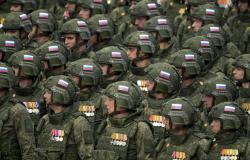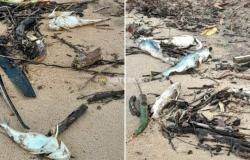Hamburg wants to do everything it can to avoid ending up in the same situation as Rotterdam and Antwerp. This is what councilor Andy Grote (SPD) says, who is responsible for police and public safety in Germany’s largest port city.
The councilor speaks News hour on the day that the mayors of Rotterdam, Antwerp and Hamburg sounded the alarm to German Minister of the Interior Nancy Faeser. They want more international cooperation in Europe, but also with the countries in Latin America where the drugs come from.
Alderman Grote of Hamburg, together with the three mayors, previously visited countries in Latin America to make agreements for better cooperation. “If we can just get them to warn us as soon as suspicious containers are on their way to Europe, that is an improvement,” says Grote.
Networking
In his approach to illegal drug imports, the councilor in Hamburg is now setting up a special security center where all services involved – such as customs, police, Public Prosecution Service and the port authority – work together. “The drug criminals have excellent networks, so we have to do even better.”
A large part of drug crime revolves around the trade in cocaine. This mainly comes in Antwerp, Rotterdam and Hamburg. Together, the three ports have seen the quantities of cocaine intercepted increase tenfold in ten years.
The so-called extractors, young criminals who remove drugs from containers on orders, were also briefly seen in Hamburg last summer. “Suddenly there were young Dutch men with backpacks climbing over the fences. They turned out to have cutting torches and other tools with them,” says Grote.
The municipality then increased the security of the container port to such an extent that the extractors disappeared again. Grote: “The fact that they were Dutch also shows that our criminals had not yet come up with this idea. We would like to keep it that way.”
The mayor of Rotterdam, Ahmed Aboutaleb, says serious crime is a problem in many major European cities. “It really is a European issue. Of course we see in Rotterdam that our vulnerable neighborhoods are suffering from crime. That it is apparently easier to interest young people in drug trafficking, in taking out at the port, than in good education. We should intervene to motivate young people for a mainstream career in mainstream education.”
Narco-state
According to Alderman Grote in Hamburg, legalizing cocaine to stop crime – as Amsterdam Mayor Femke Halsema recently advocated – is out of the question. “Also because we understand from other Dutch sources that your misery just started with the legalization of cannabis.”
Halsema said at the beginning of this year that the Netherlands risks becoming a “narco state” without a fundamental change of course. She is in favor of regulating the trade in hard drugs in order to take it out of the hands of serious criminals. Police, judiciary and outgoing Minister of Justice Dilan Yesilgöz (VVD) said they did not see any point in this.
Aboutaleb believes that regulating or legalizing drugs suggests that “those criminals retire.” “He doesn’t see that happening. “The criminals are shifting again to other trade, such as weapons. They’re really not going to stop.”
The parties that are now talking about forming a new cabinet – PVV, VVD, NSC and BBB – are also in favor of a more repressive than a more liberal drug policy.






